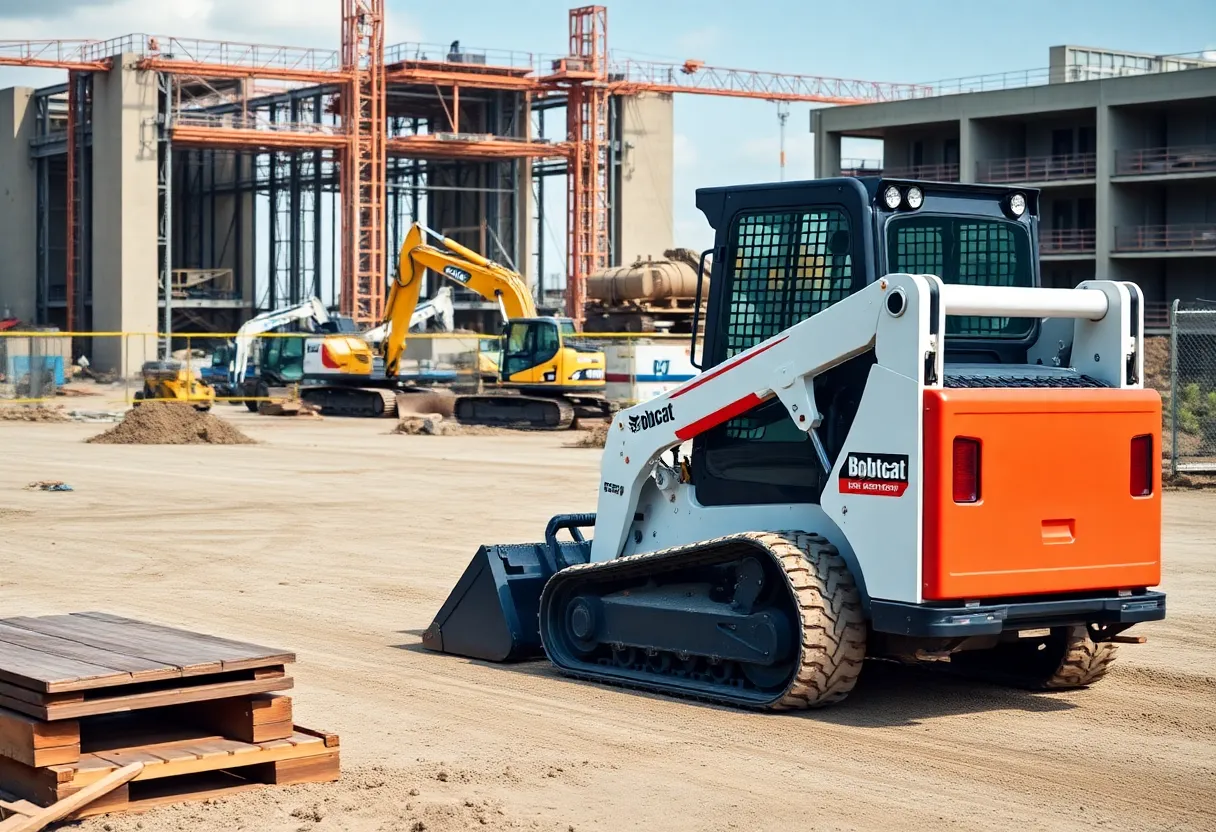News Summary
Bobcat Company highlights the critical issue of equipment theft during National Vehicle Theft Prevention Month, revealing that the construction industry faces losses between $300 million and $1 billion annually. With job sites often vulnerable, Bobcat offers advanced security features in its telematics software to help safeguard machinery. The company also showcased innovative technologies at bauma 2025, emphasizing the shift toward electrification and automation in construction equipment, as well as the growing market for autonomous machinery.
Bobcat Company Addresses Equipment Theft Amid $300 Million Crisis
July has been designated as National Vehicle Theft Prevention Month. In light of this, Bobcat Company has taken the initiative to highlight the growing issue of equipment theft plaguing the construction industry. Equipment theft is a rising problem that costs the industry between $300 million and $1 billion annually, a significant burden that affects various construction companies.
The equipment rental sector faces approximately $100 million in losses each year due to equipment theft. With these soaring figures, the need for effective prevention measures has become increasingly critical. Garrett Maurer, the director of digital product management at Bobcat, emphasizes the growing challenges of preventing equipment theft on active job sites. Construction firms are now looking to bolster security measures to safeguard valuable investments.
Smart Security Solutions from Bobcat
To combat this persistent issue, Bobcat has integrated advanced features into its telematics software. These tools empower construction businesses to better track their equipment and implement various security measures. Notably, features include the ability to track equipment locations in real-time, set operational curfews, and enact geofencing, which restricts equipment usage to designated areas.
One of Bobcat’s standout technologies is part of its Machine IQ platform. This platform allows operators to remotely disable or enable an engine via an app or online portal. The capability to control unauthorized use of machinery provides a significant edge in preventing theft.
Technological Innovations at bauma 2025
As technology progresses, the construction industry sees continuous advancements in heavy-duty mobile equipment. At the recent bauma 2025 exhibition, several key players in the industry unveiled cutting-edge machinery focused on electrification, automation, and digitalization. Notably, Caterpillar Inc. celebrated its 100th anniversary by showcasing 48 machines, including 17 innovative solutions.
Among Caterpillar’s new machines is the 330 UHD Ultra High Demolition Hydraulic Excavator, which features a Stability Monitoring System to enhance safety during operations. Another notable introduction is the Cat 775 off-highway truck, designed with future autonomous capabilities and integrating existing automated mining technologies.
Bobcat also presented its new R2 Series mini excavators, featuring a SmartFlow hydraulic system that enhances operational efficiency. Additionally, the company introduced concept machines like the TL25.60e electric telehandler and the RogueX all-electric autonomous compact loader, highlighting its commitment to innovation.
International Developments in Electrification
Other manufacturers like CASE Construction Equipment showcased both engine and battery-powered machines at bauma, while Volvo Construction Equipment unveiled its first battery-electric articulated hauler, which will be available for rental in European markets starting in 2026. Furthermore, updates on electric variants of existing machinery were also part of the display, reflecting the industry’s shift toward greener alternatives.
Growth of the Autonomous Construction Equipment Market
The autonomous construction equipment market is projected to experience significant growth, increasing from $4.43 billion in 2024 to an estimated $9.86 billion by 2030. Key factors driving this expansion include labor shortages, safety improvements, cost efficiency, and a focus on increasing environmental sustainability.
In the Americas, a robust market share exists for autonomous construction equipment, fueled by high infrastructure demand and a growing need for mined materials. Leading manufacturers like Caterpillar and John Deere are integrating artificial intelligence and machine learning technologies into their products, reflecting a broader trend of innovation in the construction sector.
Despite these advancements, the British Standards Institution indicates that the construction industry’s AI readiness lags behind other sectors, scoring only 1.9 out of 5. Nevertheless, major players such as Deere & Company, Caterpillar, Komatsu, and Volvo Construction Equipment are making strides in autonomous technologies that promise to reshape the landscape.
Additionally, advancements in battery technology and sustainable solutions continue to pave the way for electric autonomous construction equipment. Chinese OEMs like XCMG, SANY, and LiuGong presented numerous electric and hybrid machines at bauma, specifically designed to meet European standards.
As the construction industry navigates this turbulent environment marked by theft and technological changes, companies like Bobcat lead the charge with innovative security and major advancements in equipment technology, setting a precedent for the future.
Deeper Dive: News & Info About This Topic
Additional Resources
- Construction Equipment: The Weekly Iron – July 8, 2025
- Wikipedia: Construction Industry
- On-Site Magazine: Bobcat Addresses Machine Security
- Google Search: Bobcat machine security
- Power Motion Tech: Bauma 2025 Advances
- Google Scholar: Construction Technology Advancements
- MinuteHack: Digital Transformation in Heavy Equipment
- Encyclopedia Britannica: Digital Transformation
- Construction Equipment: JLG Industries Enhancements
- Google News: JLG Industries
- Construction Equipment Guide: AED Goals for Tech Careers
- Google Search: Equipment Technology Careers
Author: Construction CA News
The CALIFORNIA STAFF WRITER represents the experienced team at constructioncanews.com, your go-to source for actionable local news and information in California and beyond. Specializing in "news you can use," we cover essential topics like product reviews for personal and business needs, local business directories, politics, real estate trends, neighborhood insights, and state news affecting the area—with deep expertise drawn from years of dedicated reporting and strong community input, including local press releases and business updates. We deliver top reporting on high-value events such as the Rose Parade, Coachella, Comic-Con, and the California State Fair. Our coverage extends to key organizations like the California Building Industry Association and Associated General Contractors of California, plus leading businesses in technology and entertainment that power the local economy such as Apple and Alphabet. As part of the broader network, including constructionnynews.com, constructiontxnews.com, and constructionflnews.com, we provide comprehensive, credible insights into the dynamic landscape across multiple states.


